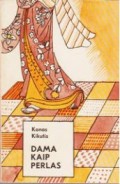 Original language:
Japanese
Original language:
Japanese Translated from: Russian
Authors: Kikuchi, Kan
Translated by: Viršulis, Antanas
Full translated source bibliographical description:
Kan, Kikuti, Portret Dami S Žeamčugami, M., Ichl, 1977
Published in: Vilnius
Published on: 1982
Publisher: Vaga
XIX century Japan rapidly developed capitalist industry and for a part from aristocracy, who didn‘t want to because poor, had to adapt to the newly emerging class – the bourgeoisie. That atmosphere is showed and in Kan Kikuchi novel “Madame Pearl“.
The novel tells the story how one of the main characters, Acumi Shinjitaru is traveling to Yagawara to his wife, accidentally becomes a fellow-traveller to Aoki Dziun, a young student who is hurt by a loved woman, and he cannot find peace, decides to go away from Tokyo. But during their travel to Yagawara, a disaster occurs, the car rolls downhill and the young student dies. Before his death, Aoki, transmits to Shinjitaru a notebook and a watch chain, and a request to return the watch to the woman, that hurted him, in addition, mentions an unknown woman\’s name – Rurika. Shinjitaru reads the notebook and, he predicts, that owner of that watch, maybe is the mysterious woman Rurika. Of course, he returns it to her, easily and quickly falls in love with her, but he escapes from her feelings towards him because of perception that men, who fell in love with her, die.
The author‘s created picture of Rurika is probably the most valuable achievement in the novel. She remained pure in body, mind, and a soul like a pearl while she gradually rose in power over men. Being a gorgeous woman, and in addition she is courageous, charming, active, strong-willed, extremely educated, open-minded and a bright mind woman, as well fighting for women\’s equality – totally opposite contrasting her to her predecessors, who was passive, limited, servile character of Japanese women.
Rurika father comes from the impoverished aristocratic family. Feud Karasawa fall into Shōda Shōhei toils. So Rurika decides to save and at the same time to preserve hers and her father‘s honour, by taking a decisive step – agrees to become Shōda wife and decides to avenge Shōda and all the men for poaching her first love feeling.
Of course a reader in the first part of the novel, can miss picture of Rurika, when she was young, gentle and innocent, before she married Shioda and how she changes quickly after becoming his wife and becomes exquisitely clever and a serpent miss, how she takes revenge on all men for that she was forced sacrifice and marry an unloved man. Rurika is not tempted by gold, when she marries Shioda, how other believed and she never betrays the man, who was her true first love. Also, there may be doubts on a real predator capitalist Shōda change, when he marries her he really falls in love with her and he forgives everything to her before he dies. After Shioda‘s death, Rurika lives in one house with his children, Minaka and Katsuhiko. When she parties with her admirers, Aoki‘s younger brother falls in love with madam Rurika, and after some time, he proposes to her, but she repels him, because she finds out, that her stepdaughter – Minaka loves Aoki‘s younger brother. Love for her stepdaughter, becomes the reason of Rurika‘s death. Minaka‘s fate is not known and even for the writer, because it touches future. But, we can guess that her care is entrusted to Naoja (man who was Rurika first love).
The story is composed of separate parts which are mixed. In the beginning of the story, author writes about Aoki-san‘s death and funeral, and only after that he writes why and how Rurika becomes Shōda wife and his children stepmother. The shortcomings of the novel, redeems author‘s skilfully developed plot and intrigue, which remains until the end of the novel, mesmerizingly described events and characteristic details, extraordinary narrative lightness.
Japanese writer Kan Kikuchi (born 1881 years) in Kahawa Prefecture, Takamatsu town. He studied in Tokyo educational school, Meiji, Waseda and Kyoto universities. When he studied, he was the member of the publishing company “Bungeishunjū“, the monthly magazine of the same name, the Japan Writer\’s Association. Writer belonged to such a group of writers in which talented, new direction of writers have sought moral and ethical in the novel emerge aspects of conflict resolution, they tried to portray realistic works of the inner world of the personality, highly rated language and style.
